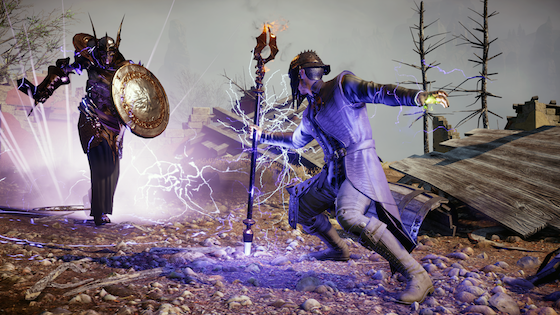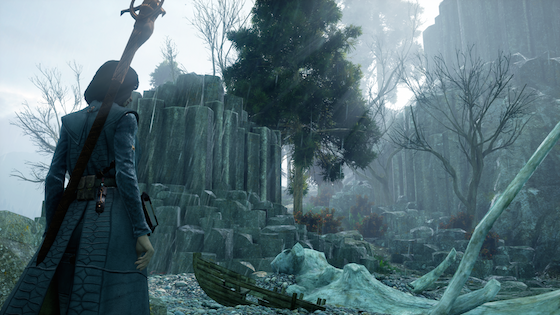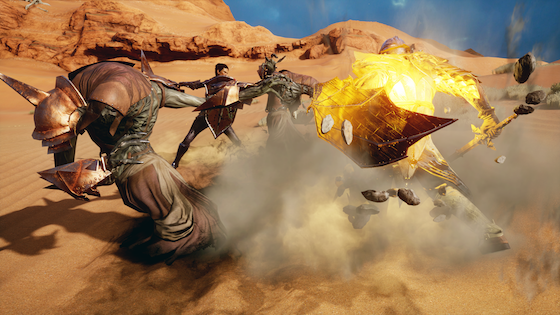Game-expert en mede-geek Melinda Jacobs, ook wel bekend van Subatomic en Clustr.at, schreef speciaal voor Lady Geek een review van Dragon Age: Inquisition. Disclaimer: we kregen een recensie-exemplaar van EA, maar alle meningen in dit artikel zijn origineel en objectief.
Dragon Age: Inquisition started out like any other RPG for me. During installation, my old faithful 2007-era PS3 kicked its cooling fans into warp. With RPGs this is quite the familiar sound, most notably from my 200+ hours exploring Elder Scrolls: Skyrim, where every moment sounded like a battle between life and death for my poor little PS3. I could tell Inquisition would be the same, and hoped for the best (spoiler alert: after 60+ hours of gameplay, the PS3 lives on to fight another day).
Not surprisingly, Inquisition is also in its gameplay more or less like any other RPG around. I did feel a bit “thrown into things” at the beginning, but that feeling goes away after a few hours of gameplay if you push through. You progress in the main storyline by performing – more often than not mundane – sidetasks, gaining upgrades and pocketing (hopefully) useful items from corpses, chests, and buildings. What separates Inquisition from being “just another RPG” with 200+ hours of gameplay is its narrative and writing. Although some dialogue is lackluster, most of its universe – its folklore, its people, its happenings – has depth.

Inquisition takes the player back into the world of Thedas, where a peace conference between the civil warring mages and the templars is disrupted by a giant explosion. The origin of the explosion is the sudden opening a giant breach in the sky from which demons from the Fade pour out. Your character is the sole survivor of the explosion and has no recollection of the moment, but a new power that allows the character the close the breaches/rifts.
Yes, once again you’re a “chosen one” who is “suffering” but still off to “save the world” from a “main evil”, but Dragon Age uses this story line to make you deal with complex moral issues, hidden agendas, and blurry lines that many other games don’t approach. The conflict between the mages and the templars is an interesting political addition to the more usual “search and destroy evil” narrative. At many points, there are blurry lines explored in dialogue. Playing as an elf and a mage also offers up a different side to the world that you wouldn’t encounter playing as other races or classes.
I have to admit I didn’t read every letter and every text I encountered in the game, in part because the text boxes are tiny and the font is unreadable, but I still felt immersed through side chatter by my team and random people I’d encounter. This being said, dialogue really is a highlight of the game. It is clear that a lot of time was spent on that during development. This is seen also in the fact that the average adventurer population of Thedas has had better luck concerning arrows and knees than other worlds.

While managing the inquisition, do expect a lot of “paperwork”, “negotiations”, and “project management” gameplay. Nearly everyone you encounter will need something from you. Ironically, I found this to be somewhat soothing, as it was very akin to the duties of running a B2B startup. Although Dragon Age’s combat system includes a top-down vantage point in battles, I rarely used it, preferring a “run in and stab things” approach for most situations. If you enjoy obsessive compulsive collecting items and objects, you’ll be happy with the amount of looting, but I did feel like Skyrim had the better approach to looting when comparing the two.
The gameplay has its clunky moments, most notably being for me (playing on Playstation 3) the “x” actions. Instead of picking things up or using ladders, my character had the tendency to jump. Constantly. It’s funny the first few times, but at a certain point it just gets awkward and annoying. Much like the awkward silences that can occur in dialogue – but that has led to more awesomeness in general:
Even though you can switch characters, you should note that the game really wants you to play as the main character and the game can get a bit odd if you aren’t embodying them most of the time.
As with other Bioware games, there’s the ability to pursue gay and lesbian relationships, and in Inquisition you’ll even meet a transgender character. Although the dialogue options with this character weren’t always perfect, it’s great to see more and more queer representation. It’s not everything, but it’s a step in the right direction, especially after previous titles in the series. On the other hand, there weren’t a lot of options for hair and skin tones in the character creation, which I think would be appreciated by most players.
All in all, in short:
- quests, quests, and more quests
- tons of content
- storyline is not just black and white, good and evil – there’s a lot of grey
- combat mechanics are well done
- the jump mechanic will drive you nuts, but otherwise gameplay is not too buggy
- yay, LGBTQ representation – but boo, character customization
I wasn’t completely wowed like I have been playing other Bioware titles, but I was impressed with the amount of content, the quality of the dialogues, and the break from what else is out there in RPGs in terms of characters and storyline.

